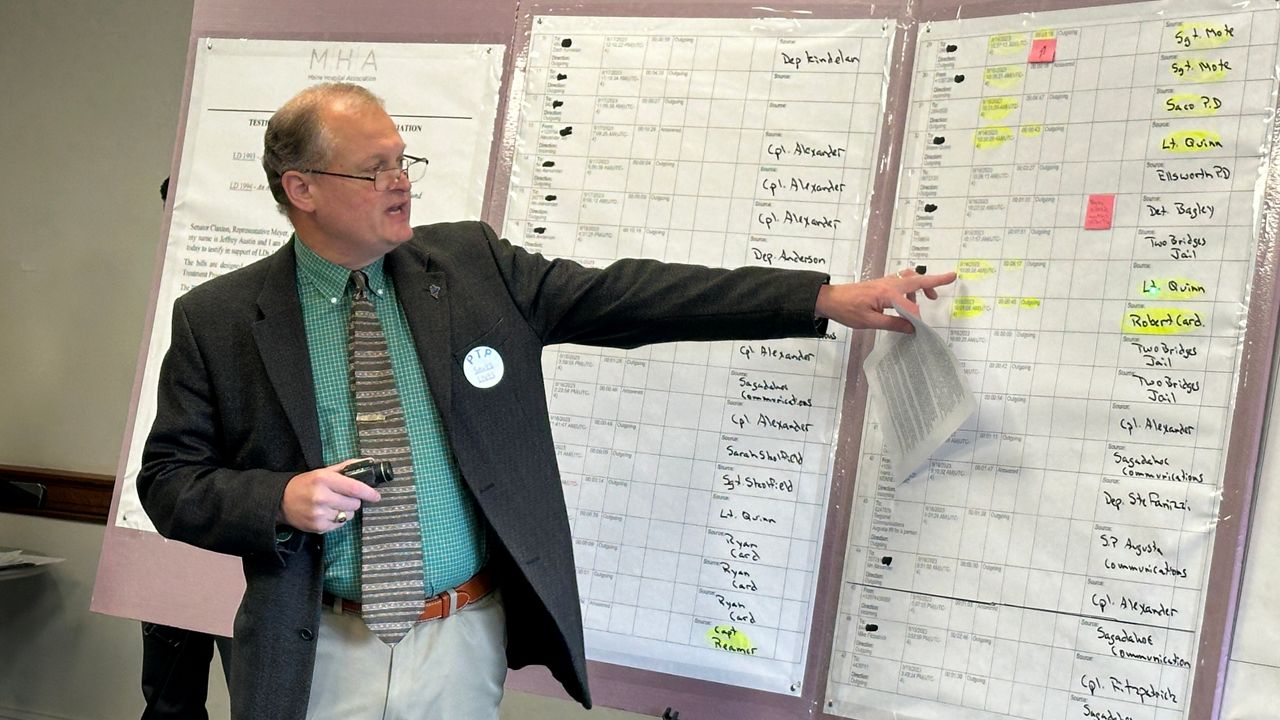The deputy criticized for not using Maine’s yellow flag law to take the Lewiston shooter into custody is speaking out.
Sgt. Aaron Skolfield of the Sagadahoc County Sheriff’s Office said Tuesday he’s frustrated with Gov. Janet Mills and a commission that studied the shootings in which 18 people were killed on Oct. 25, 2023.
The commission concluded Skolfield could have done more to try to stop Robert Card, 40, of Bowdoin a month before the killings. The report singles out Skolfield for not making contact with Card after Army Reserve officials requested a welfare check when Card made threats against fellow reservists.
On Tuesday, Skolfield brought six large poster boards to the State House to highlight what he says are omissions and mistakes in the commission’s report.
“I’ve been a good cop for 31 years and to suddenly think that now all of a sudden I’m going to go ‘nah, I tried’ and walk away,” Skolfield said at a news conference. “That’s not at all true. And she (Mills) knows it and so did every member of that commission.”
In response, commission spokesman Kevin Kelley said commissioners took their jobs “seriously without regard to politics and the final report speaks for itself.”
“To suggest otherwise is irresponsible and does a disservice to the people of Maine, particularly the victims and their families,” Kelley said.
Another issue for Skolfield is what he characterized as the politicization of the report by Mills.
Skolfield is running for sheriff and last month, Mills told local voters to read the commission’s report before they vote on Nov. 5. Skolfield, a Republican, is challenging incumbent Democrat Sheriff Joel Merry.
“This fall the people of Sagadahoc County will have before them an opportunity to judge both Sgt. Skolfield and Sheriff Merry and I urge the people of Sagadahoc County to read this report and consider it deeply as they decide who should be the next sheriff of Sagadahoc County,” Mills said Sept. 6.
In response to follow up questions from reporters, Mills said she is not endorsing any candidate in the race, but again repeated her call for Mainers to read the report before they vote.
“It is quite clear that Deputy Skolfield, for instance, had probable cause to believe that this individual had a mental health issue and was dangerous and had access to firearms,” she said.
Skolfield defended his actions Tuesday, saying that Army officials downplayed the danger posed by Card in phone conversations. He said the yellow flag law in effect at the time did not allow him to “kick in the door” to Card’s home so he could take him into custody without a warrant.
Since then, the law has been amended so police can go to a judge for a warrant without having to first see someone in person.
Skolfield, who was off duty on Tuesday, said he did not want to speak about his concerns with the commission’s conclusions but felt compelled to after Mills called him out last month.
“She took this horrible tragedy and made it a political sideshow when she strongly hinted to voters this fall who to consider who they voted for for Sagadahoc County sheriff,” he said. “A despicable and abhorrent act, to say the least, on the governor’s part.”
Mills spokesman, Ben Goodman, released a statement saying that the commission acted independently and that their findings were not influenced by anyone. The governor’s comments last month reflected her reaction to the report and she “has nothing further to add.”
Skolfield was joined at the State House Tuesday by supporters of the state’s Progressive Treatment Program, which allows police, a health care professional or a guardian to seek a court order to require someone with a psychiatric disorder enter a state program.
Former Sen. John Nutting said the state has not fully implemented the program because of a philosophical disagreement about whether people with mental health conditions should be required to get treatment.
Maine Department of Health and Human Services spokeswoman Lindsay Hammes said in a statement that DHHS has implemented the program consistent with state law, which does not give the department oversight authority.
She added that the department is committed to “working with law enforcement and the broader medical and behavioral health community” to ensure safety and help those “with complex mental health needs.”
Nutting said when Card was released from a New York psychiatric hospital in August 2023, he should have gone into the Progressive Treatment Program.
“It was up to the state of Maine to make sure he stayed on his treatment plan,” he said.
But Kelley disagreed. He said the commission considered testimony from the Shattering Silence Coalition, which believed that Card could have been enrolled.
However, the first step in the program is to be diagnosed with a “persistent and severe mental illness” and Card did not meet that criteria at the time, Kelley said.
The commission’s report reached several conclusions about missed opportunities in the months leading up to the state’s deadliest mass shooting.
In addition to finding that Skolfield had sufficient probable cause to use the yellow flag law, it found that that Army Reserve failed to protect the public even when it knew of Card’s “hallucinations, increasingly aggressive behavior, collection of guns and ominous comments about his intentions.”
When Mills shared her thoughts about the commission’s report last month, she identified failures by multiple people at multiple levels.
“At its core, this tragedy was caused by a colossal failure of human judgement by several people on several occasions,” Mills said. “A profound negligence, that as the commission rightly stated, was an abdication of responsibility.”



